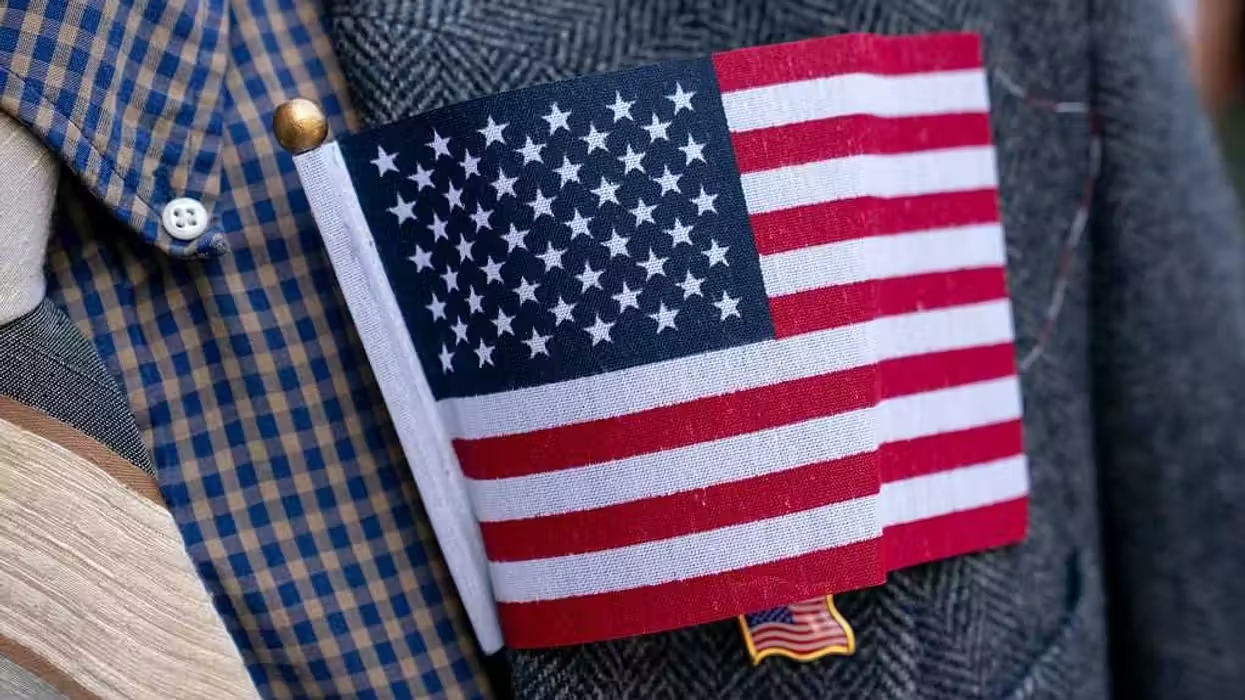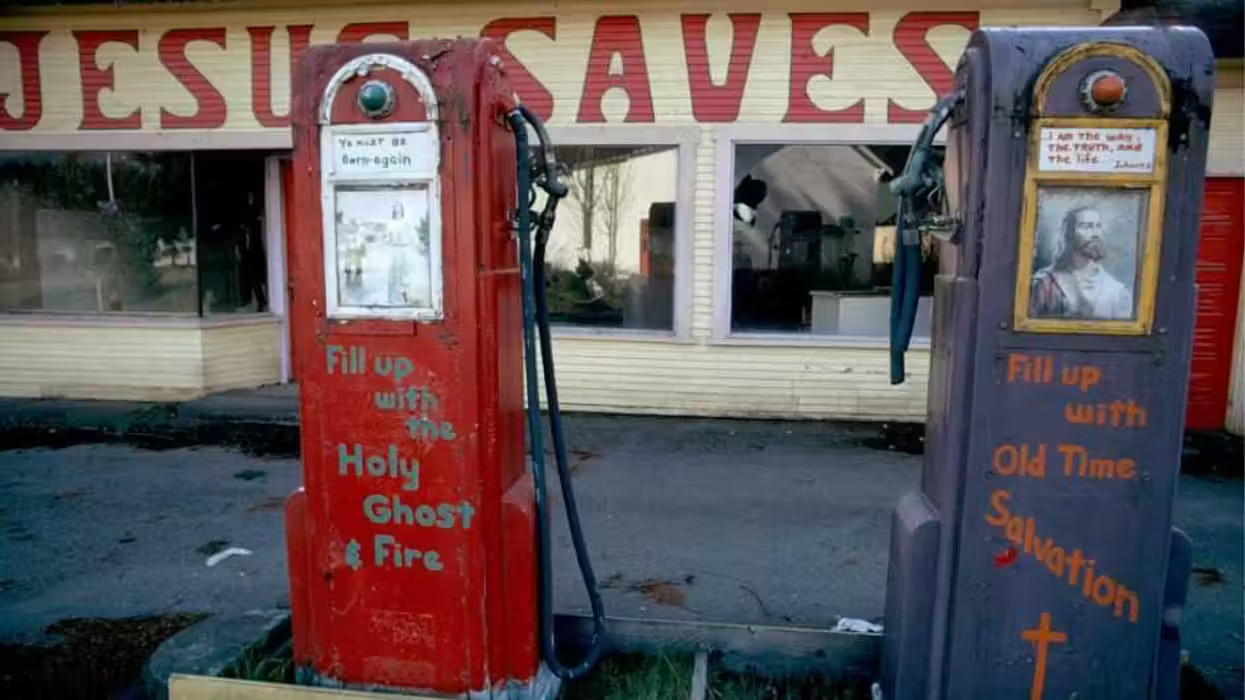
© 2026 Blaze Media LLC. All rights reserved.
America's History Should Not Be 'Hidden Behind Glass': Beck Unveils Priceless American Artifacts Including Honest Abe's Desk
July 30, 2012
From Babe Ruth's suitcase to a letter penned by John Wilkes Booth.
Cicero once said that “history is the witness that testifies to the passing of time; it illuminates reality, vitalizes memory, provides guidance in daily life, and brings us tidings of antiquity.” Yet in today's day and age, a growing contingent are losing sight of our nation's past and its meaningful artifacts. Often, people feel they can only catch these rare glimpses of history at a museum, where a letter from Honest Abe, or the helmet a five-star general wore on D-Day, are ensconced behind glass.
If you were to ask Glenn Beck, he'd say that American history should be attainable -- that it belongs to you, Americans, to hold in your hands and to learn from. Few are more informed or enthusiastic about America's rich past than Beck. In fact, many of his programs feature historical themes intended to educate and inform viewers.
Many of the items featured during Restoring Love, and again on Monday evening's episode of the Glenn Beck Program were borrowed from private collections. Beck said that each of these priceless pieces of American culture and heritage represents a "sign post" along our country’s path. Below is a review of these magnificent, one of a kind artifacts.
Arnold Friburg's painting of George Washington praying at Valley Forge: Best known for his 1975 painting "The Prayer at Valley Forge," few know that an earlier "color study" version of this profound painting exists. Beck, who purchased this color study copy, which will ultimately be donated, "is going to be the basis of something we are kicking off in 2014 --- something amazing," Beck revealed.
He said he wants to ensure that our nation's historic pieces are not lost, but are preserved to teach Americans for generations to come.
Gettysburg Log: Another interesting artifact is a log procured from Gettysburg and that harbors two small cannonballs. This was featured along with a wooden beam that was used underneath an operating table for soldiers during the Civil War. Beck observed that upon it was spilled with the blood of great, brave men.
General Dwight D. Eisenhower's helmet: Worn on D-Day, Beck said that items such as this, which encapsulate so much history do not belong under glass. "The helmet tells us that somebody fought for somebody else's freedom," he began.
"It's not enough to fight for our [own]. Freedom belongs to all mankind and there has to be a country that will stand up" not only for our freedom but for the freedom of other countries as well.
"All of these things teach us something," Beck added before showing the audience that etched on Eisenhower's helmet is what appears to be a Star of David. Beck promised that his researches will do their best to find out the meaning and origin of the star.
Babe Ruth's traveling luggage: Beck said just to hold the handles of what Ruth carried is remarkable in and of itself.
Abraham Lincoln’s desk and chair from the IL State House: So priceless that it is uninsurable, President Abraham Lincoln’s desk and armchair from the Illinois State Senate are, according to Beck, "truly stunning." It is adorned with acorns, leaves and shields and was where the man who many believe was our nation's greatest president conducted his day to day affairs. Beck showcased where Honest Abe placed his pen and even recited a precious letter Lincoln himself penned on the matter of slavery. That contents of that letter is featured below.
If A. can prove, however conclusively, that he may, of right, enslave B. — why may not B. snatch the same argument, and prove equally, that he may enslave A?–You say A. is white, and B. is black. It is color, then; the lighter, having the right to enslave the darker? Take care. By this rule, you are to be slave to the first man you meet, with a fairer skin than your own.
You do not mean color exactly?–You mean the whites are intellectually the superiors of the blacks, and, therefore have the right to enslave them? Take care again. By this rule, you are to be slave to the first man you meet, with an intellect superior to your own.
The manifesto of John Wilkes Booth: In a kind of painful irony, after marveling at the profundity of our nation's great president, Beck then revealed "a crazy man's writing." Page upon page of frantic scribblings and strike-throughs, it is apparent even at first glance that the man who assassinated Lincoln was deranged. Below is an excerpt that Beck recited -- an excerpt that eerily mirrors the sentiments of today's Occupy Wall Street contingent.
For God be my witness, I love peace…but there is a time when men should act for themselves…it is a time for us to throw off all gentler feelings of our natures and summon resolution, pride, justice. Ay, and revenge.
"Nuts," Beck observed of the killer.
Declaration of Independence acid etching: This acid sketching of the Declaration of Independence is actually more vibrant than the original housed in the National Archives. Ironically, it was the process of making the copy that faded the original in the first place. Beck featured this beautiful rendition during Restoring Love.
Honus Wagner baseball card: While the condition of this rare baseball card of the Major League shortstop affectionately dubbed "The Flying Dutchman" may be poor, it is valued at over $2 million. What is perhaps most profound about the card, however, was not the image of Honus Wagner, but rather the advertisement for Sweet Caporal Cigarettes etched on its flip-side.
"Back in the day everybody smoked or chewed tobacco," Beck observed. But not Honus Wagner. Smoking went against the baseball legend's faith and convictions. As a result, he asked that his name be removed from the card and that which he opposed. The move caused tremendous conflict at the time, but Wagner held true to his convictions.
The point, according to Beck, is that the card teaches us that there is value in standing for what you believe in. "We have to learn from history...it really, truly screams at us and it teaches us something."
President Ronald Reagan's letter to his daughter, Patti: Written in 1991 during a time when Reagan and his daughter were estranged, this poignant letter opens with: "Dear Patti -- it was good to hear from you."
"I think this is the most beautiful card I've ever read," observed an emotional Beck, who added that what makes the letter so significant is the fact that its contents articulate something "we can all relate to." We, as a country, are also "like this," he added. Below is the transcript:
Dear PattiIt was good to hear from you. As the song goes - 'the days dwindle down to a precious few.' In view of my recent birthday I find the song appropriate. Patti I think a talk between us is the answer to some of our differences. There are extremists on both sides of every issue. Reasonable people should look into both sides and see if every charge or countercharge is justified by the facts. Even if there are differences does this justify a family separation? We can disagree on things without abandoning our family relationship. I remember a little girl who sat on my lap and asked me to marry her. Love - Dad."
While Patti Davis would later go on to speak with her father, and mourn his passing deeply, Beck noted that she "sold this letter for drug money."
"Share this with your neighbors who might disagree with you," he urged. "We are not extremists and we are a family as a nation. We have to come together on the things that do unite us."
Want to leave a tip?
We answer to you. Help keep our content free of advertisers and big tech censorship by leaving a tip today.
Want to join the conversation?
Already a subscriber?
more stories
Sign up for the Blaze newsletter
By signing up, you agree to our Privacy Policy and Terms of Use, and agree to receive content that may sometimes include advertisements. You may opt out at any time.
Related Content
© 2026 Blaze Media LLC. All rights reserved.
Get the stories that matter most delivered directly to your inbox.
By signing up, you agree to our Privacy Policy and Terms of Use, and agree to receive content that may sometimes include advertisements. You may opt out at any time.







